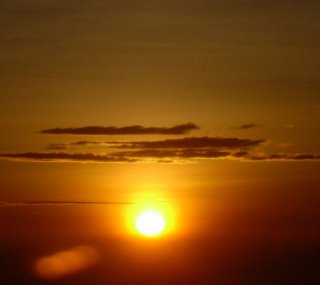It was the longest series of flights I’ve ever experienced. In fact, as I write this, I still have one more flight. I’m onboard, in my seat, on the ground awaiting the last of four flights — this one from
My journey started at 5 a.m. Thursday when I arose to prepare for the first flight from LAX to
That fight was quite nice. Since my journey exceeds 16 hours, government regulations say that government contractors must bump their workers up to business class. That meant some really comfortable seating.
 The gentleman who sat next to me approved of the high-tech seats. And he seemed to have the authority. It turns out he was on his way to
The gentleman who sat next to me approved of the high-tech seats. And he seemed to have the authority. It turns out he was on his way to
He typically recruits volunteers to sit in a couple different styles of car seats and rate different aspects. Then, they test the seat experience on the road. They never know which of the seats are the ones Lear wants to buy. The others are part of a control group.
Our two professions overlapped in the area of the interview process and the objectives of the interview. As a journalist, my goal is to get people to tell me stuff I didn’t know — whatever they say is fine with me. After all, it’s their story to tell and they can have their own opinions. My goal is to get good information and lively quotes.
On the other hand, Scott uses a rule he calls the 10-80-10 rule. He can’t expect everyone to love the product — that would be an impossible goal — so he hopes to find cumulative answers that indicate that 10 percent of the people love it, 10 percent of the people hate it and 80 percent of the people think it’s OK. He has others ask the questions of the participants — he processes the responses. I shared with him some of my open-ended, no-questions-asked techniques and he said he’d consider trying it out.
It was a lot of fun.
We arrived in
 The flight to
The flight to
Now, we’re about to take off, It’s 9:30 a.m. Saturday. The flight is about an hour and a half. I’m not sure if there will be anyone to great me. If they don’t, however, I’m sure I’ll find my hotel.
Shower.
That’s about all I’m thinking of right now. I hope I can get to the Internet before long so that those of you who work late into the night or get up before dawn can get a glimpse of the Saturday sunrise long before you get to experience it.
My assignment, by the way, is to conduct four week-long training sessions with journalists in
The program is part of
Does any of this make sense?
Oh, I’ll end this posting with a challenge for your sleuths at home:
The winner will be the first person to translate this:
Boya la kujiokoa liko chini ya kipumzisha mkono. Funga mkanda unapoketi.
I’ll bring a special (cheap) gift to the first person. And, of course, I’d like you to tell me the language.
Good luck.
Quick update. I’m here. I’m sleepy. More later.
 And a final note. I've tried for two days to get this text in place and struck out. Maybe this time it will work. On Sunday, we flew to Blantyre where I'll be doing a weeklong seminar. I finished the course outline at 2:40 a.m. and went to sleep. I just woke up to realize I didn't turn off the paid Internet. So before I do, I'm trying again to post this text.
And a final note. I've tried for two days to get this text in place and struck out. Maybe this time it will work. On Sunday, we flew to Blantyre where I'll be doing a weeklong seminar. I finished the course outline at 2:40 a.m. and went to sleep. I just woke up to realize I didn't turn off the paid Internet. So before I do, I'm trying again to post this text.





No comments:
Post a Comment